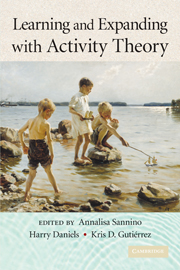Book contents
- Frontmatter
- Contents
- Contributors
- Editors' introduction
- 1 Activity Theory Between Historical Engagement and Future-Making Practice
- PART ONE UNITS OF ANALYSIS
- PART TWO MEDIATION AND DISCOURSE
- PART THREE EXPANSIVE LEARNING AND DEVELOPMENT
- PART FOUR SUBJECTIVITY, AGENCY, AND COMMUNITY
- PART FIVE INTERVENTIONS
- 16 Who Is Acting in an Activity System?
- 17 Past Experiences and Recent Challenges in Participatory Design Research
- 18 Clinic of Activity: The Dialogue as Instrument
- 19 The Future of Activity Theory: A Rough Draft
- Bibliography
- Author Index
- Subject Index
16 - Who Is Acting in an Activity System?
Published online by Cambridge University Press: 05 June 2012
- Frontmatter
- Contents
- Contributors
- Editors' introduction
- 1 Activity Theory Between Historical Engagement and Future-Making Practice
- PART ONE UNITS OF ANALYSIS
- PART TWO MEDIATION AND DISCOURSE
- PART THREE EXPANSIVE LEARNING AND DEVELOPMENT
- PART FOUR SUBJECTIVITY, AGENCY, AND COMMUNITY
- PART FIVE INTERVENTIONS
- 16 Who Is Acting in an Activity System?
- 17 Past Experiences and Recent Challenges in Participatory Design Research
- 18 Clinic of Activity: The Dialogue as Instrument
- 19 The Future of Activity Theory: A Rough Draft
- Bibliography
- Author Index
- Subject Index
Summary
How is it, are we the material or are we the producer of the outcomes or observations … although I understand that it is difficult in a way, because it is as if emerging from discussions, but in what place can such observations be made that now the idea emerged and now we share the same opinion?
(Excerpt from a Change Laboratory session, Spring 2006, in the project “Crossing Boundaries for Helping Families at Social Risk”)
Having an educational background in Marxian sociology, I have been inspired and affected by the research methodology proposed by Yrjö Engeström for the dialectical study of links between the individual and the society. Drawing on the cultural-historical school of psychology, he has argued for a “radically new methodology” that incorporates historicity and developmental judgment into analyses that might “yet take fully into account the diversity and multiplicity inherent in human activities” (Engeström, 1999a, p. 28). This methodology became identified with a collective learning activity from the very beginning. By introducing the methodology of developmental work research with his colleagues, Engeström broke new ground in the theory of his own disciplinary field of adult education. The aim of developmental work research was to enable workers to become conscious subjects of their own learning activity and to combine independent learning activity with work.
The foundations of the methodology are presented in the book Learning by Expanding (Engeström, 1987) in such a rich way that this text continues to carry forward certain, partly unfulfilled ideas related to how to study individual learning and societal change from the point of view of human development.
- Type
- Chapter
- Information
- Learning and Expanding with Activity Theory , pp. 257 - 273Publisher: Cambridge University PressPrint publication year: 2009
- 11
- Cited by



